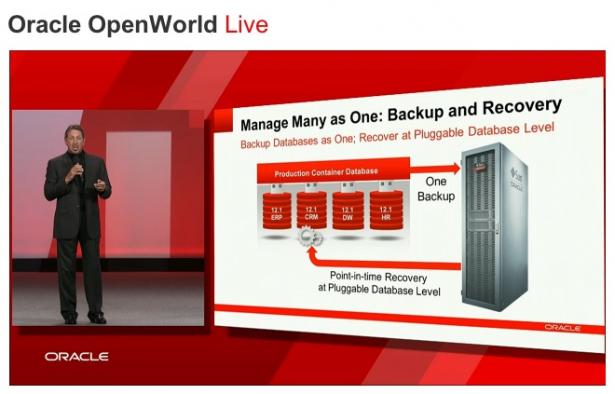Ellison keynote at OOW: it's about speed and cost


I was surprised at Larry Ellison's opening keynote streamed live from the Moscone Center, San Francisco.
Ellison spent his keynote talking about cloud, partially re-writing history in the process so we know Oracle has been in the cloud business since 2004, the time it started working on Fusion. Over the course of a very well managed speech running less than 55 minutes, Ellison carefully laid out the components of Oracle's cloud strategy going forward. Much of this was well anticipated but two things struck home.
First, I found Ellison's measured and relatively slow delivery a welcome change from the past. While he could not avoid the odd barb thrown in the direction of competitors: on SAP Hana - 'She's a small machine' - he largely ignored competition except when he offered a direct price comparison with IBM:
Ellison did pull out a comparison to IBM at this point, highlighting that the Exadata X3-2 Half Rack outperforms the IBM P780 database at an eighth of the price.
Some colleagues were less than impressed.
I didn't see a lot of vision in the keynote, rather a sales pitch that was aimed at customers interested in speed and cost improvements. That missed the mark in my view because as Misiorek says: where are the business cases? I would have been far more impressed if Ellison could have talked even mild futures with examples of how customers benefit from what Oracle will soon be offering.
The second point that intrigued me is the discussion around multi-tenant databases. Ellison said that the multi-tenant database dubbed Oracle 12c offers significant advantages over the ways on which the existing cloud application vendors approach multi-tenancy which is at the application layer:
Described as the "software foundation of the Oracle Cloud," the multi-tenant pluggable database architecture consists of the memory, processes, and storage of multiple databases all consolidated into one container database. Ellison stressed that this combines all the benefits of multi-tenancy as well as hardware and operational efficiencies without any change to the application at all.
He went on to explain that the DB multi-tenant approach solves problems the cloud app vendors cannot answer very well, including security, the ever present nemesis of cloud alternatives to the on-premise hegemony. This is a curious statement because while security remains a strong topic for CIOs implementing cloud solutions, I don't see security as a generalised show stopper in any deal where the cloud player has a demonstrably sensible story.
While back channel observers believe the idea of a multi-tenant database shows much promise, I wonder about the switching of trade offs. At the same time, the multi-tenant database as described is not a proven concept. Oracle will have a lot of convincing to make this stick.
Instead, it strikes me that Oracle is putting a technically led sales stake in the ground that sets up the next religious war around cloud architectures. Oracle will be positioned as the only provider capable of offering a secure reliable end to end stack that can be deployed anyway any organisation chooses.
That sounds good when heard from the keynote stage but it will be in the devil's details that Oracle's expansive value proposition, tied as it will be to lock-in at many levels, gets played out. That is of course assuming that decisions around cloud purchases gravitate beyond the line of business and onto the CIOs desk. Even then I wonder if the argument is compelling enough for buyers to be tempted into rip and replace of recent cloud implementations.
Having set the tone, which Zoli Erdos thought: "@dahowlett IS it just me or was @larryellison kinda professorish, speaking too slow.."
It will be interesting to see how the remainder of the keynotes play out. If this is a sign of a more serious Oracle then I'd argue competitors need take detailed notes. When Oracle becomes serious, it is playing to win more so than when Ellison is cracking jokes.
Image credit: Oracle